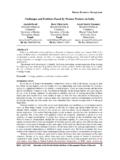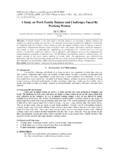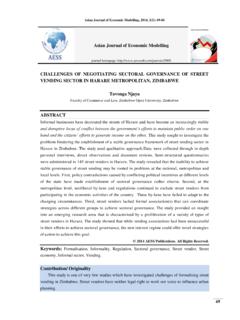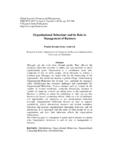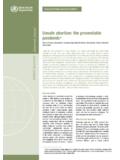Transcription of Boosting Jobs and Incomes - OECD
1 POLICY LESSONSFROM REASSESSINGTHE OECD jobs STRATEGYONFERENCE ON Boosting jobs and IncomesPOLICY LESSONS FROM REASSESSINGTHE OECD jobs STRATEGYCB oosting jobs and 126-Jun-2006 5:28:33 PMORGANISATION FOR ECONOMIC CO-OPERATION AND DEVELOPMENTB oosting jobs and IncomesPOLICY LESSONS FROM REASSESSING THE OECD jobs TRATEGYORGANISATION FOR ECONOMIC CO-OPERATION AND DEVELOPMENTThe OECD is a unique forum where the governments of 30 democracies work together toaddress the economic, social and environmental challenges of globalisation. The OECD is also atthe forefront of efforts to understand and to help governments respond to new developments andconcerns, such as corporate governance, the information economy and the challenges of anageing population.
2 The Organisation provides a setting where governments can compare policyexperiences, seek answers to common problems, identify good practice and work to co-ordinatedomestic and international OECD member countries are: Australia, Austria, Belgium, Canada, the Czech Republic,Denmark, Finland, France, Germany, Greece, Hungary, Iceland, Ireland, Italy, Japan, Korea,Luxembourg, Mexico, the Netherlands, New Zealand, Norway, Poland, Portugal, the Slovak Republic,Spain, Sweden, Switzerland, Turkey, the United Kingdom and the United States. The Commission ofthe European Communities takes part in the work of the Publishing disseminates widely the results of the Organisation s statistics gathering andresearch on economic, social and environmental issues, as well as the conventions, guidelines andstandards agreed by its available in french under the title:Stimuler l emploi et les revenusLES LE ONS A TIRER DE LA R VALUATION DE LA STRAT GIE DE L OCDE POUR L EMPLOI OECD 2006No reproduction, copy, transmission or translation of this publication may be made without written permission.
3 Applications should be sent toOECD Publishing: or by fax (33 1) 45 24 13 91. Permission to photocopy a portion of this work should be addressed to the Centrefran ais d'exploitation du droit de copie, 20, rue des Grands-Augustins, 75006 Paris, France jobs AND Incomes POLICY LESSONS FROM REASSESSING THE OECD jobs STRATEGY 3 Boosting jobs AND Incomes POLICY LESSONS FROM REASSESSING THE OECD jobs STRATEGY OECD 2006 Foreword In 1994, OECD countries endorsed a set of policy guidelines intended to cut high and persistent unemployment the OECD jobs Strategy. For a decade, this groundbreaking work became an influential blueprint in the reform process of member countries.
4 In 2003, the Employment and Labour Ministers asked the Secretariat to reassess the jobs Strategy in light of new evidence and emerging challenges . Given the critical importance of well-functioning labour markets for good economic and social outcomes, my predecessor as Secretary-General, Donald Johnston, assigned a very high priority to this mandate which was completed under his stewardship. This report, together with the background analysis published as the 2006 edition of the OECD Employment Outlook, responds to such ministerial request. It puts forward a restated OECD jobs Strategy with a comprehensive set of policy recommendations covering macroeconomic management, incentives to work and to create jobs , taxes and welfare benefits as well as skills development.
5 The OECD countries have a lot to gain from implementing the new recommendations emerging from this reassessment, in terms of improved labour market performance and social progress. This will also contribute to strengthen the capacities of our societies to adapt and change, and to meet the challenges posed by globalisation and population ageing. The report highlights the need for the restated jobs strategy to take into account national social preferences and circumstances. There is no single road to better labour markets. But it is essential that each country undertake a coherent policy package.
6 I believe that countries which will take action along the lines of the restated OECD jobs Strategy will be rewarded by a stronger labour market and, most importantly, improved living standards. Angel Gurr a OECD Secretary-General Boosting jobs AND Incomes POLICY LESSONS FROM REASSESSING THE OECD jobs STRATEGY 5 Boosting jobs AND Incomes POLICY LESSONS FROM REASSESSING THE OECD jobs STRATEGY OECD 2006 Boosting jobs AND Incomes Policy Lessons from Reassessing the OECD jobs Strategy The time is ripe to reassess the 1994 jobs Strategy in light of new challenges In the mid-1990s, the OECD formulated a set of policy recommendations intended to reduce joblessness and improve labour market performance.
7 This took place against the background of sharp rises in unemployment over several decades. The ten broad recommendations in the OECD jobs Strategy (see the Annex) constituted a wide-ranging programme to tackle the key challenges of that period. A decade later, the time has come to take stock of whether these policy recommendations have proved effective and how they might need to be revised and extended to respond to new challenges . The challenges faced by policy makers in most OECD countries concerned with improving labour market performance have widened. The original jobs Strategy focused mainly on ways to cut high and persistent unemployment.
8 While this is still an important unfinished task in many countries, removing barriers to labour market participation has become the key priority, made more urgent by the need to limit the adverse consequences of population ageing. A further key challenge is to ensure that people and firms are able to take advantage of, and adjust quickly to, changes brought about by technological advances and globalisation. Such adjustment pressures may intensify in the future as large labour-rich countries, such as China and India, become better integrated in the world economy. The reassessment in this report1 concentrates on the original policy recommendations most directly related to the functioning of the labour market.
9 The part of the original jobs Strategy that has not been included in this reassessment, namely recommendations to enhance the creation and diffusion of technological know-how, remains important and has been reviewed recently in detail in the OECD Growth Indeed, the policy recommendations contained in that study and in the Going for Growth publications are important complements to this This report first gives an overview of labour market performance since 1994 (Section I), and then reviews the new insights gained from analyses and experiences of what works and what does not (Section II).
10 Informed by this analysis, a revised subset of the original policy recommendations is then presented at the end of the report as the Restated OECD jobs Strategy. 1. This report is based on analyses presented in the OECD Employment Outlook 2006. 2. See OECD (2003), The Sources of Economic Growth in OECD Countries, Paris. 3. See OECD (2005), Going for Growth, Paris; and OECD (2006), Going for Growth 2006, Paris. 6 Boosting jobs AND Incomes POLICY LESSONS FROM REASSESSING THE OECD jobs STRATEGY Boosting jobs AND Incomes POLICY LESSONS FROM REASSESSING THE OECD jobs STRATEGY OECD 2006 I.










